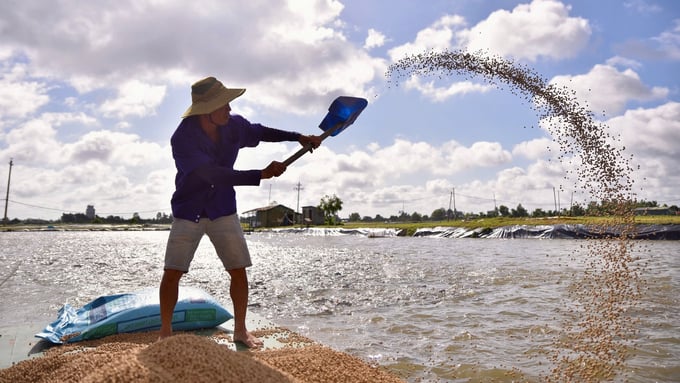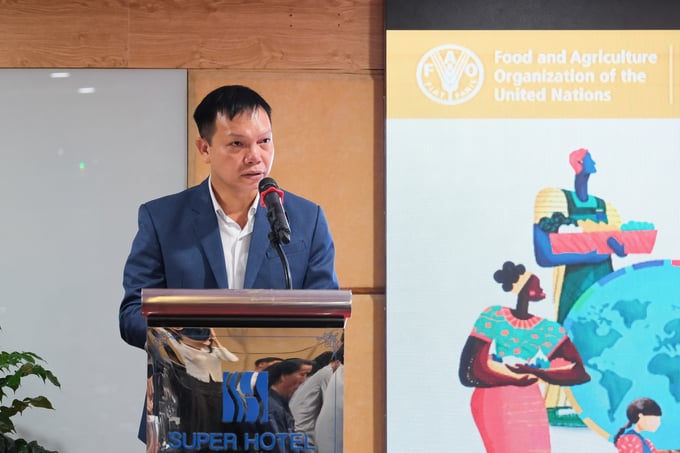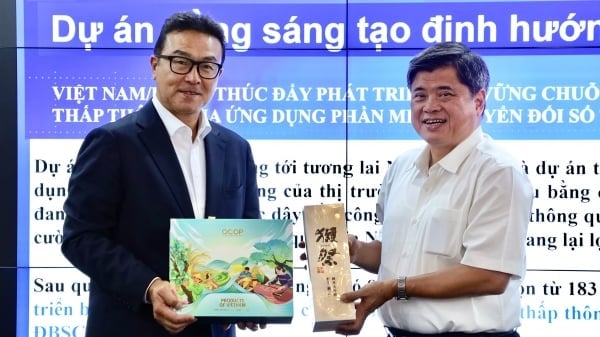May 25, 2025 | 11:22 GMT +7
May 25, 2025 | 11:22 GMT +7
Hotline: 0913.378.918
May 25, 2025 | 11:22 GMT +7
Hotline: 0913.378.918

September 29 is International Day of Awareness of Food Loss and Waste. Photo: Quynh Chi.
Every year on September 29, the world joins together to celebrate the International Day of Awareness of Food Loss and Waste. This day was first held in 2020 to draw global attention to an urgent issue that has far-reaching impacts on food security, the environment, social equity and sustainable development.
Food loss and waste (FLW) causes huge economic losses to global agriculture. Every year, more than 10% of food volume is lost in the supply chain before reaching consumers. Even when food has reached families, restaurants and catering services, more than 1 billion tons of food continues to be wasted worldwide. The amount of food dumped in landfills accounts for up to 10% of total greenhouse gas emissions from the food production system, causing environmental pollution and increasing climate change.
On this occasion, the Food and Agriculture Organization of the United Nations (FAO) commended Vietnam's commitments to reduce food loss and waste. In particular, Decision 300 of the Government on transforming the food system to be transparent, responsible and sustainable has been highly appreciated by the international community.
At the celebration of the International Day for Awareness of Food Loss and Waste, Mr. Nguyen Song Ha - Assistant Representative of FAO in Vietnam, issued a call for action. Vietnam Agriculture Newspaper respectfully introduces Mr. Nguyen Song Ha's speech.

Mr. Nguyen Song Ha - Assistant Representative of FAO in Vietnam called for action to reduce food loss and waste. Photo: Quynh Chi.
Tackling food loss and waste requires a concerted effort from all stakeholders. Both the public and private sectors can take concrete actions to not only reduce food loss and waste but also contribute to climate change mitigation efforts. Together, we can take action to:
1. Raise public awareness of the importance of reducing food loss and waste.
2. Improve food production, harvesting and distribution activities to ensure food safety, food quality and reduce food loss and waste.
3. Introduce innovative low-greenhouse gas emission technologies to address the root causes of food loss and reduce food waste.
4. Optimize public procurement and public stockpiling programs to reduce food loss and waste.
5. Invest in research and innovation targeting research and academic institutions, start-ups, micro, small and medium food processing enterprises, and initiatives to reduce food loss and waste towards reducing greenhouse gas emissions.
6. Improve coordinated public-private investments by promoting the development of public-private partnerships to invest in infrastructure, logistics and low-GHG technology innovations that improve supply chains.
7. Adjust the strictness of regulations and standards for fresh food to reduce the level of food loss on the farm.
8. Improve information dissemination. Provide consumers and suppliers with information about the benefits of reducing food loss and waste.
9. Improve intervention targeting to focus on areas with high levels of food loss in terms of location and commodity, taking into account nutrient loss
10. Change pricing mechanisms through public policies to avoid wasting food.
11. Guide consumers to change their behavior and encourage sellers and consumers to make responsible decisions.
12. Take collective, coordinated action across supply chains at the city and national levels to reduce food waste.
13. Improve the circular economy by prioritizing prevention, reduction and recycling to reduce greenhouse gas emissions from food waste in landfills.
14. The future is in our hands. Stop the loss and waste of natural resources. For people. For the planet!
The overall loss in the agricultural and aquatic products sector in Vietnam ranges from 20 to 25%. The total loss is estimated at about 8.8 million tons, equivalent to 3.9 billion USD, accounting for about 2% of the country's GDP and 12% of the GDP of the entire agricultural sector. FAO Representative in Vietnam - Remi Nono Womdim hopes that strong and comprehensive efforts will help Vietnam transform the food system for better production, better nutrition, better environment and better life, so as not to leave anyone behind.
Translated by Quynh Chi

(VAN) On May 23, Deputy Minister of Agriculture and Environment Tran Thanh Nam held a working session with a Japanese delegation on the application of digital technology in agricultural production.

(VAN) In the tranquil wetlands of Van Long, there are quiet souls who guard the forests, nurture the waters, and oversee every bird and troop of langurs as protecting the essence of a living heritage.

(VAN) WWF, GIZ, IUCN, UNDP call for biodiversity conservation and sustainable development must be regarded as a unity in strategies for a green future.

(VAN) On celebration of International Day for Biological Diversity, Deputy Minister Nguyen Quoc Tri called for practical actions to address nature and biodiversity conservation.

(VAN) Dr. Hoang Thi Thanh Nhan – Deputy Director of the Nature and Biodiversity Conservation Agency – highlighted this on the International Day for Biological Diversity, May 22, 2025.
![Ho Chi Minh city adapts to climate change: [2] Accelerating action](https://t.ex-cdn.com/nongnghiepmoitruong.vn/608w/files/chiqk/2025/05/22/4024-4220-bien-doi-khi-hau-1-100626_766.jpg)
(VAN) Clearly recognizing the challenges posed by climate change, Ho Chi Minh city has swiftly shaped its policies and implemented practical solutions to adapt.

(VAN) Rice straw is no longer just a discarded byproduct, but it is becoming a green resource that helps farmers in the Mekong Delta reduce emissions and promote circular, sustainable agriculture.